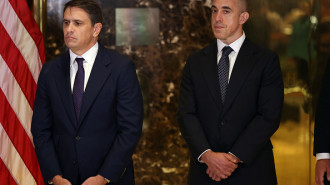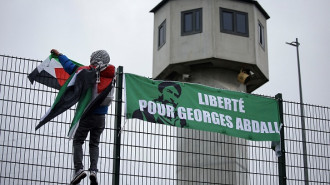Hizballah 'blackmailed defendants', Abu Dhabi court hears
Hizballah agents blackmailed two Emiratis accused of handing over classified information to the group, a witness told Abu Dhabi's Federal Supreme Court on Monday.
The witness told the court how Hizballah, which the Arab League and Gulf monarchies recently classified as a "terrorist group", recruited the defendants.
"Photos of some of the defendants in sexually compromised situations were used to extort them and put pressure on them to work with the organisation," said the witness, according to Emirati website The National.
Two Emirati nationals and five foreigners are being tried on charges of forming a terror cell linked to the Lebanese Shia militant group.
The defendants include a UAE police officer who is accused of providing military information to Hizballah, and another Emirati who allegedly gave the Shia movement details of interior ministry officials, according to local press.
According to the witness, one of the Emirati defendants married an Egyptian who worked for an oil company to obtain information from her.
"He married her as a ploy to obtain sensitive information from her workplace to hand over to the organisation," the witness said.
The 54-year-old woman, who is also one of the defendants, reportedly gave her husband unpublished information about the UAE's energy sector.
The witness also said that Hizballah paid nearly seven million Dirhams ($1.9 million) to one of the defendants, while others received gifts such as mobile phones and tablet computers.
 |
Photos of some of the defendants in sexually compromised situations were used to extort them and put pressure on them to work with the organisation. |
 |
The defendants also travelled to Lebanon on several occasions to meet members of Hizballah, the witness said.
Tensions between Lebanon and Gulf countries have recently been running high over the influence of the Iranian-backed Hizballah movement in Lebanon and Syria.
In February, Saudi Arabia cancelled a $3 billion grant for Lebanon's Army and police force, and issued travel warnings against Beirut.
Bahrain, Qatar and Kuwait followed with similar travel advisories, while the United Arab Emirates banned its nationals from travel to Lebanon.
The moves come against the backdrop of increased tensions with Tehran this year after demonstrators stormed the Saudi missions in Iran following Saudi Arabia's execution of a Shia cleric, prompting Riyadh to cut diplomatic ties.
![Hizballah Lebanon [AFP] Hizballah Lebanon [AFP]](/sites/default/files/styles/large_16_9/public/media/images/54E038F4-5A27-4035-81C1-094DDE929AB3.jpg?h=d1cb525d&itok=UIcJMgdG)






 Follow the Middle East's top stories in English at The New Arab on Google News
Follow the Middle East's top stories in English at The New Arab on Google News


![Aid Gaza [Getty]](/sites/default/files/styles/image_330x185/public/2010004231.jpeg?h=cb957c44&itok=NpHeiZFt)